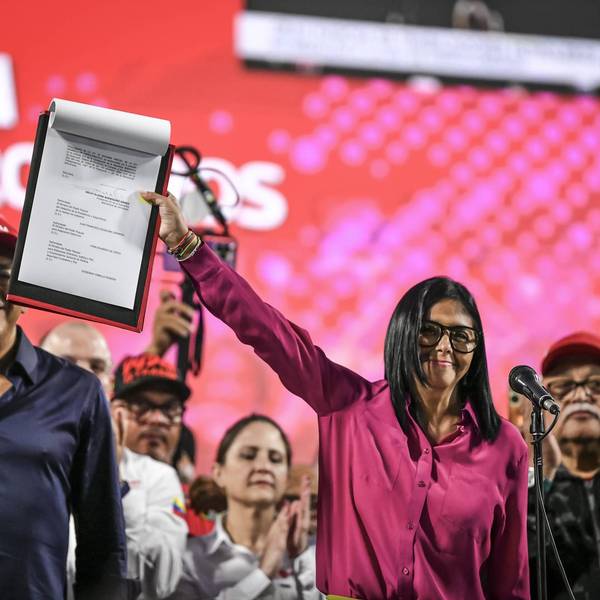The Trump administration signed another love note to extractive industries on Thursday when it announced it was withdrawing the U.S. from a global program aimed at increasing transparency and accountability for oil, gas, and mineral companies and their payments to governments.
"This is a disappointing, backwards step," said Fredrik Reinfeldt, chair of the Extractive Industries Transparency Initiative (EITI).
A diverse group of voices reacted by saying the administration's stated basis for backing out of the effort is false.
Reuters explains that the
EITI, which was founded in 2003, and which the United States joined in 2014, sets a global standard for governments to disclose their revenues from oil, gas, and mining assets, and for companies to report payments made to obtain access to publicly owned resources, as well as other donations.
As such, said Chase Huntley, senior energy and climate director at The Wilderness Society, the back-out "is further evidence of the administration's flabbergasting disregard for the public's right to know how their energy assets are being managed."
The State Department webpage on the EITI, still available as of this writing, touts the effort, stating the "U.S. Government has been a strong supporter of EITI since its founding in 2003, recognizing that transparency is a critical component of sound governance in countries' extractive sectors." It adds: "In September 2011 the United States' announcement that it would implement the EITI domestically underscored the United States' view that this initiative benefits countries in all regions and all levels of development."
The move to back out of the program, as Bloomberg notes,
follows a long lobbying battle waged by the American Petroleum Institute, Exxon Mobil Corp. and Chevron Corp. against a related regulation compelling U.S. energy and mining companies to disclose those payments. President Donald Trump axed that rule earlier this year.
In his letter (pdf) to Reinfeldt announcing the decision, Gregory Gould, director of the Interior Department's Office of Natural Resources Revenue, writes, "it is clear that domestic implementation of EITI does not fully account for the U.S. legal framework."
But U.S. Senator Ben Cardin (D-Md.), ranking member of the Senate Foreign Relations Committee, and former U.S. Senator Dick Lugar (R-Ind.), challenge that assertion.
The senators, who helped push the U.S. to become an implementing country of the EITI, said in a joint statement, "The Department's justification for withdrawing from EITI--because the initiative contravenes the U.S. legal framework--is a front meant to mask Big Oil and Gas' money and influence, the real reason fueling this sad day in the movement toward greater global sunlight and transparency in extractive industries."
"There is no U.S. law that prevents oil, gas, or mining companies from voluntarily disclosing their federal tax payments to the American people. The Trump Administration's move today is a painful abdication of American leadership on transparency and good governance," Cardin and Lugar added.
Echoing the senators' argument, Corinna Gilfillan, head of the U.S. Office at Global Witness, said her anti-corruption group "dispute[s] the U.S. government's claim that U.S. laws prevent compliance with the EITI standard when it is Exxon and Chevron's preference for secrecy that made it impossible for the U.S. to comply." She added: "When major Russian and Chinese oil companies are disclosing more information about their deals around the world than their U.S. counterparts, you have got to ask: what are Exxon and Chevron so desperate to hide?"
Watchdog group Project On Government Oversight similarly a raised a flag about the basis for the decision.
According to Danielle Brian, executive director of POGO and the civil society chair of USEITI, a mulit-stakeholder group which oversees U.S. implementation, "The government is suggesting that U.S. laws restrict companies from revealing information, including taxes, but this is not the truth. The government is perpetuating a false narrative created by the oil and gas industries that protect themselves and not the American people."
The move "will result in the public not knowing if they are getting every dollar due to them from the extraction of public resources," she continued. "Instead, it's another example of how this administration is taking deliberate actions to give industry an out of proportion voice in the policy decisions being made."




